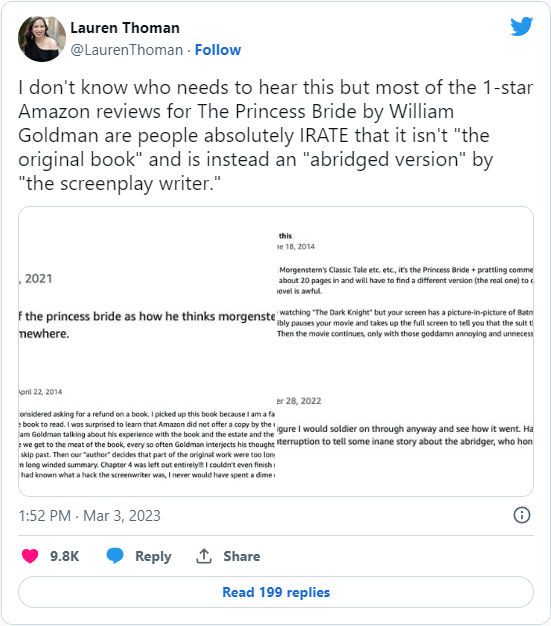Vlogging Through History
Published 9 May 2023
(more…)
August 21, 2023
Cunk on America – Historian Reacts
August 16, 2023
That useful German word, Fremdschämen
At Oxford Sour, Christopher Gage recounts a cringe-worthy example of Fremdschämen from his university days:
Back in university, our English literature professor assigned Jonathan Swift’s A Modest Proposal.
After peeling myself off an undisclosed living room carpet, I trundled into university at the ungodly, semi-torturous hour of 9 a.m. The Geneva Convention still drags its heels in deeming this a cruel and unusual punishment.
The hall filled up in dribs and drabs. One kid, the type who nodded furtively even when there was nothing to nod at, couldn’t wait to tell the world what he thought of The Modest Proposal.
Reader, I cannot directly quote here. One, because memory fails, and two because memory fails. Anyway, he charged into the work.
“Quite frankly,” he said. “I think it is disgusting. To think that even a few hundred years ago someone of apparent letters would propose such a twisted solution to poverty and to hunger is quite frankly abhorrent.”
After relishing his clearly rehearsed diatribe, he sat down and glanced over at the girls. To reward his brilliance, had they disrobed in the hope he sires them with his superior genes right then and there? There was to be no public Genghis Khan moment.
The lecturer, a Clark Kent lookalike with an expressive Roman nose, didn’t know what to say. Neither did anyone else. I admit that in my hungover, hangxiety-ridden, did-I-use-protection state, I briefly pondered whether the joke was on me. Swift was serious?! He meant we should feed poor children to the rich?
The professor said: “Interesting point”.
The lecture hall took on the air of the firing squad. Surely, someone would let fly the first bullet? Aiming neatly above his head, the professor revealed as one would deliver a diagnosis of a terminal illness. Swift’s Modest Proposal was “not given in sincerity” — the bourgeoise version of the proletarian phrase: Are you fucking stupid or something?
The boy crimsoned. His face beat so red he looked like a disgruntled toffee apple. “Oh, no. I knew that” he said. “Of course. I just. It’s just. I think. You know. Of course. I … it’s just shocking to me how … you know… how like … anyone could even print that as a joke?”
(I add the question mark to denote the Millennial tendency to dement declarative sentences into questions for fear of getting things wrong.)
I learned a new word that day. Fremdschämen: The German word for vicarious embarrassment or “cringe”.
August 11, 2023
Toward a more perfect Homo Sovieticus
Ed West on the interplay between Soviet ideology and Soviet humour during the Cold War:

Krushchev, Brezhnev and other Soviet leaders review the Revolution parade in Red Square, 1962.
LIFE magazine photo by Stan Wayman.
Revolutions go through stages, becoming more violent and extreme, but also less anarchic and more authoritarian. Eventually the revolutionaries mellow, and grow dull. Once in power they become more conservative, almost by definition, and more wedded to a set of sacred beliefs, with the jails soon filling up with people daring to question them.
The Soviet system was based on the idea that humans could be perfected, and because of this they even rejected Mendelian genetics and promoted the scientific fraud Trofim Lysenko; he had hundreds of scientists sent to the Gulag for refusing to conform to scientific orthodoxy. Lysensko once wrote that: “In order to obtain a certain result, you must want to obtain precisely that result; if you want to obtain a certain result, you will obtain it … I need only such people as will obtain the results I need.”
Thanks in part to this scientific socialism, harvests repeatedly failed or disappointed, and in the 1950s they were still smaller than before the war, with livestock counts lower than in 1926.
“What will the harvest of 1964 be like?” the joke went: “Average – worse than 1963 but better than 1965”.
The Russians responded to their brutal and absurd system with a flourishing culture of humour, as Ben Lewis wrote in Hammer and Tickle, but after the death of Stalin the regime grew less oppressive. From 1961, the KGB were instructed not to arrest people for anti-communist activity but instead to have “conversations” with them, so their “wrong evaluations of Soviet society” could be corrected.
Instead, the communists encouraged “positive satire” – jokes that celebrated the Revolution, or that made fun of rustic stupidity. “An old peasant woman is visiting Moscow Zoo, when she sets eyes on a camel for the first time. ‘Oh my God,’ she says, ‘look what the Bolsheviks have done to that horse’.” The approved jokes blamed bad manufacturing on lazy workers, while the underground and popular ones blamed the economic system itself. This official satire was of course nothing of the sort, making fun of the old order and the foolish hicks who still didn’t embrace the Revolution and the future.
Communists likewise set up anti-western “satirical” magazines in Poland, East Germany, Czechoslovakia and Hungary, where the same form of pseudo-satire could mock the once powerful and say nothing about those now in control.
Indeed in 1956, the East German Central Committee declared that the construction of socialism could “never be a subject for comedy or ridicule” but “the most urgent task of satire in our time is to give Capitalism a defeat without precedent”. That meant exposing “backward thinking … holding on to old ideologies”.
[…]
Leonid Brezhnev had a stroke in 1974 and another in 1976, becoming an empty shell and inspiring the gag: “The government of the Union of Soviet Socialist Republics has announced with great regret that, following a long illness and without regaining consciousness, the General Secretary of the Central Committee of the Communist Party and the President of the highest Soviet, Comrade Leonid Brezhnev, has resumed his government duties.”
Brezhnev was an absurd figure, presiding over a system few still believed in. His jacket was filled with medals – he had 260 awards by the time of his death – and when told that people were joking he was having chest expansion surgery to make room for all the medals he’d awarded himself, he apparently replied: “If they are telling jokes about me, it means they love me.”
July 27, 2023
History Summarized: The Cities of Ancient Sparta
Overly Sarcastic Productions
Published 14 Apr 2023Is. This. Sparta???
SOURCES & Further Reading:
– “The Spartans” from Ancient Greek Civilization by Jeremy McInerney
– “The Greek Polis – Sparta” from The Foundations of Western Civilization by Thomas F. X. Noble
– “Dark Age and Archaic Greece” from The Greek World: A Study of History and Culture by Robert Garland
– “Being a Greek Slave” from The Other Side of History by Robert Garland.
– The Greeks: A Global History by Roderick Beaton
– The Greeks: An Illustrated History by Diane Cline.
– AskHistorians posts by u/Iphikrates “Is the Military Worship of the Spartans Really Justified?” (https://www.reddit.com/r/AskHistorian…)
– “This. Isn’t. Sparta.” by historian Bret Devereaux argues that Sparta was a horrible place to live, had poorly educated citizens, was militarily mediocre, culturally stagnant, and was ruled by elites who were pretty crappy too. Anything inaccurate in that assessment?” (https://www.reddit.com/r/AskHistorian…)
(more…)
QotD: The causes of crime in Britain
I had noticed before that rain improves the behavior of young British people: It discourages them from leaving their homes. Rain is also the best, almost the only, prophylaxis nowadays in Britain against crime. Every afternoon for many years I walked between the hospital and the prison, in both of which great institutions I worked. In fine weather, seven or eight parked cars en route would have been broken into, the shards of their smashed windows sparkling prettily in the gutter as the sun caught their facets. But in the rain, not a single car was ever broken into. From this I naturally concluded that the fundamental cause of crime in Britain was sunshine. The statistics were unarguable.
Theodore Dalrymple, “Pray for Rain”, Taki’s Magazine, 2017-07-08.
July 19, 2023
Win A Point, Add A Layer Of Clothing | Badminton Insight Singles Match
Badminton Insight
Published 10 Apr 2022A Badminton singles match BUT each time someone wins a point we have to add a layer of clothing!
(more…)
July 12, 2023
DOES YOUR FLAG FAIL? Grey Grades The State Flags!
CGP Grey
Published 2 Apr 2023
(more…)
July 7, 2023
This would be a Super Bowl halftime show I’d absolutely watch
Christopher Gates makes the case for Weird Al Yankovic being the star of the next Super Bowl halftime show:
“Weird” Al has pretty much universal appeal
With most of the acts that could be selected for the Super Bowl halftime show, a sizeable portion of your potential audience isn’t going to like them. Whether it leans more towards rap/hip hop music or pop music or whatever the case may be, you’re going to have plenty of people that aren’t into it.
Since “Weird” Al’s work spans genres and time frames, you don’t have to worry about that. There’s almost universal appeal in having someone with this sort of talent perform on the biggest possible stage, because you could have a show that hits pretty much all of the different types of music that would appeal to anyone else.
Also, to put it bluntly: Nobody hates “Weird” Al. They might not be the biggest fans of his style of music, necessarily, but there’s nobody that really has an outright hatred or even a dislike for the guy. He’s apparently one of the nicest people in the entire entertainment industry, so he’s got that going for him … which is nice.
Think of the cameo potential
One of the best possible cases that you could make for something like this is the case for cameo appearances, which have become a bit of a thing at Super Bowl halftime shows in recent years. After all, “Weird” Al has been at this for four decades. Literally anyone that he’s parodied over the years that’s still with us is fair game for a potential cameo appearance during something like this.
All those years ago, “Weird” Al started out doing parodies of acts like Madonna and Huey Lewis and the News, and on his last studio album did send-ups of Imagine Dragons, Lorde, and Iggy Azalea. You don’t think you could sell some of those folks on the idea of sharing the biggest possible stage in the world with him for one night? I certainly think that you could. There’s really a lot of potential there, to be honest.
July 4, 2023
Buster Keaton Rides Again (1965)
NFB
Published 15 Jun 2015In this film Keaton rides across Canada on a railway scooter and, between times, rests in a specially appointed passenger coach where he and Mrs. Keaton lived during their Canadian film assignment. This film is about how Buster Keaton made a Canadian travel film, The Railrodder. In this informal study the comedian regales the film crew with anecdotes of a lifetime in show business. Excerpts from his silent slapstick films are shown
Directed by John Spotton – 1965.
June 26, 2023
QotD: The danger to mental health in a functioning meritocracy
We need our illusions or else we could not face the world; or perhaps I should say we need illusions as a genre, if not necessarily the ones we have. There are some illusions, no doubt, that hinder us or harm us, but there are others that sustain us. Humankind, said Eliot (who used the word before it became politically correct), cannot bear very much reality — especially about itself.
The illusion that one would have been a success but for malevolent circumstance is a very necessary one for a lot of people, for there is no more pitiless or cruel a world than a pure and perfectly functioning meritocracy. Such an arrangement would confront everyone, or at least almost everyone, with his own mediocrity, for the mediocre are by definition in the majority. And who is not mediocre by comparison with Mozart? In a pure meritocracy, everyone would find his true, utterly deserved level; but it is a mere prejudice that if there were justice in the world, everyone would be better off. In a pure meritocracy, there would be no paranoid defense against one’s own nullity — one could blame only oneself for it and no one else. That is why the concept of equality of opportunity, besides implying a kind of Brave New World world, is so deeply vicious, and why so many people who promote it are obviously hate-filled. They do not want to serve humanity but torture it.
Theodore Dalrymple, “The Grand Illusion”, Taki’s Magazine, 2017-08-19.
June 25, 2023
Fifty years after The Princess Bride was published
William Goldman’s novel The Princess Bride was not a blockbuster, nor did the movie adaptation get a huge box office when it released in 1987. Yet despite apparent early mediocrity, it became a cult classic. It’s now fifty years after the book came out, and Kevin Mims has a look back at both the novel and the movie:
Even by the eccentric standards of fantasy literature, William Goldman’s 1973 novel The Princess Bride is extremely odd. The book purports to be an abridged edition of a classic adventure story written by someone named Simon Morgenstern. In a bizarre introduction (more about which in a moment), Goldman claims merely to have acted as editor. Unlike Rob Reiner’s much-loved 1987 film adaptation, the book’s full title is The Princess Bride: S. Morgenstern’s Classic Tale of True Love and High Adventure, The “Good Parts” Version. Yes, all that text actually appeared on the cover of the book’s first hardcover edition (all but the first three words have been scrubbed from the covers of most subsequent editions).
In the 1990s, I worked at a Tower Books store in Sacramento. Every few months, someone would come into the store and ask if we had an unabridged edition of S. Morgenstern’s The Princess Bride. The first time this happened, a younger colleague who had worked there longer than I had told my customer, “The Princess Bride was written by William Goldman. There is no S. Morgenstern. Goldman made him up.” The customer wasn’t convinced. “It’s metafiction,” my colleague explained. “A novel that comments on its own status as a text.” When the customer had left, my colleague told me that a lot of people still believe there is an original version of the novel available somewhere, written by Morgenstern. Having fallen in love with the story via the Hollywood film, they were now looking for the ur-text.
Although I was a big fan of William Goldman, I had never read The Princess Bride. My wife and I saw the film when it first appeared in American theaters, and we have rewatched it several times since on VHS and DVD. Only about 10 years ago did I actually get around to reading the novel. And when I did, I found myself sympathizing with all those people who still believe that, somewhere in the world, there exists an unedited edition.
In his introduction, Goldman tells us that S. Morgenstern was from the tiny European nation of Florin, located somewhere between Germany and Sweden, which is where the story’s action takes place. Such a place never existed, but it’s not surprising that many 21st-century American readers don’t know the names of every current and former European kingdom. European history is littered with microstates that rose briefly and then vanished without leaving much of a trace. Back in the 1990s, before Internet access became commonplace, confirming the existence of a small defunct European statelet would have involved a trip to the library.
But readers in the 1970s might have been more alive to Goldman’s ruse. Back then, metafiction was all the rage. John Barth became a literary superstar (among the academic set, anyway) with books like The Sot-Weed Factor (which, like The Princess Bride, is a fantastical comic adventure supposedly written by a fictional author) and Giles Goat-Boy (the text of which, Barth writes in the foreword, was said to have been written by a computer). In 1983, Goldman would publish a second novel behind the Morgenstern pseudonym, titled The Silent Gondoliers, but this time he removed all mention of himself, even from the copyright page.
QotD: We won’t be seeing any rebooted TV shows from the 1990s
… most 1990s entertainment would be impossible to “reboot” now, simply because so much of it presumes a baseline level of social and especially governmental competence. Take The X-Files, for instance. The “hot take” on the show back then was that it reflected our widespread social unease with an all-powerful government. The truth is out there!
Thirty years on, we can only dream of a government competent enough to cover up contact with extraterrestrials. As someone remarked at Z Man’s the other day, our government is now so retarded, Eric Swalwell — a high-ranking member of the House intelligence committee and putative presidential candidate — couldn’t successfully bone a hooker. Sorry, gang, the aliens won’t be stopping by; they only want to make contact with intelligent life.
Severian, “Random Thoughts”, Rotten Chestnuts, 2020-12-17.
June 19, 2023
1963: Mockumentary Predicts The Future of 1988 | Time On Our Hands | Past Predictions | BBC
BBC Archive
Published 17 Jun 2023Russian moon landings, week long traffic jams, a workforce replaced by automation and above all, too much leisure time!
These are just some of the bold predictions made in Don Haworth’s 1963 BBC “mockumentary” Time on Our Hands – a remarkable film which projects the viewer a quarter of a century into the future.
Imagine how the futuristic inhabitants of 1988 — a society freed from the shackles of endless hard work — might reflect on the way people live and work in 1963. Its aim is to look back at the extraordinary, almost unbelievable, events of the intervening 25 years — referred to as “the years of the transformation”.
“This Buoyant programme could be repeated a dozen times and still intrigue, delight and disturb me”
Dennis Potter, Daily Herald TV critic, 1963This footage is compiled of excerpts from Time On Our Hands, a faux-documentary film by Don Haworth.
Originally broadcast 19 March, 1963.
June 16, 2023
Blackadder at 40
Ed West remembers his first encounter with the brilliant, devious, and hilarious Edmund Blackadder:
What do these famous figures from British history all have in common? Elizabeth I, George III, George IV, Victoria and Albert, the Duke of Wellington, Dr Samuel Johnson, Sir Walter Raleigh, Sir Douglas Haig, Richard III, er Richard IV, William Pitt the Younger, William Pitt the Even Younger …
They’re all, of course, characters in the greatest tale of our island story, a giant rollercoaster of a comedy in four sizzling chapters, one that was first shown 40 years ago today.
I was probably always going to love history — my dad was obsessed with it — but Blackadder helped imprint the idea that the past can be one great black comedy. History is funny because people’s behaviour is often quite irrational, or spiteful, or motivated by petty reasons that contrast with their high-minded principles — and no doubt we will seem the same to future generations, too.
That was the whole idea behind Blackadder because, as creator Richard Curtis points out in a documentary screened tonight on Gold, he’s “a modern person in the stupidity of ancient times”.
Yet when the idea was first proposed by Curtis and Rowan Atkinson, they were advised that there are two sitcom premises that can never work — shows set in heaven and hell, or those in historical settings. And Blackadder was lucky to survive its first season.
Atkinson and Curtis had met at Oxford, going on to work together on Not the Nine O’Clock News, where they’d met producer John Lloyd. The two men were inspired by Fawlty Towers, but were also determined to avoid any comparison with John Cleese and Connie Booth’s great creation, so decided on a setting as far removed from a south coast hotel as possible.
Aired on 15 June, 1983, The Black Adder was quite lavish. There were location shots in places like Alnwick Castle and huge amounts spent on costumes and horses. Curtis says that one of the hats Atkinson wore was worth more than he was paid for writing the episode. It featured such big names as Brian Blessed and Peter Cook, the godfather of alternative comedy whose presence granted the show its place in the apostolic succession. But, while the first series has its moments, it was flawed; the original Blackadder was a weasel-like and pathetic figure, and less clever than his sidekick Baldrick. The comedy didn’t exactly work.
I was fortunate enough to encounter the second series, set in Elizabethan England, before I saw any of the first series. The original has its funny moments, but Ed is quite correct that it’s less than the sum of its parts. Brian Blessed steals every scene he’s in (as always), and Peter Cook’s portrayal of Richard III is great. The rest … is kinda funny if you know a bit of the history. Thankfully, there was more to come.
Blackadder II aired at the start of January 1986, and had a much smaller budget and a simpler set up — and it was far, far funnier, the protagonist no longer a conniving weasel but a court sycophant with Baldrick and Percy as comedy punchbags.
“Well, it is said, Percy, that civilised man seeks out good and intelligent company, so that through learned discourse he may rise above the savage and closer to God. Personally, however, I like to start the day with a total dickhead to remind me I’m best.”
(Fans of comedy shows who quote the lines endlessly can become quite tedious but, well, tough.)
Or: “The eyes are open, the mouth moves, but Mr. Brain has long since departed, hasn’t he, Percy?”
Towards Baldrick he is somewhat more indulgent, telling him that “Thinking is so important“.
“I’ve been in your service since I was two and a half my Lord,” his dogsbody protests upon being thrown out: “Well that is why I am so utterly sick of the sight of you.”
Elton also thought the medieval era to be too squalid and wanted Season 2 set in the “sexier” Elizabethan era (and indeed Edmund’s outfit is rather sexy, as Percy might put it).
Geography Now! Finland
Geography Now
Published 23 Nov 2016Seriously though. Do those squats bro.
(more…)








